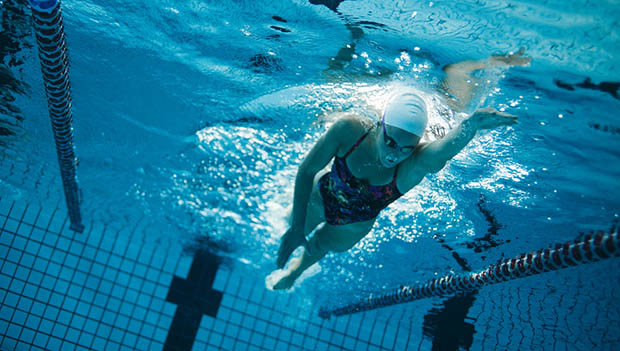
During a recent whitewater rafting trip, I slipped over the edge of my group's raft and tumbled down a small rapid―not uncommon, but still a bit frightening. Luckily, the water just past the rapid was calm, and my P.F.D. held me afloat until my guide could reach me. Before whitewater trips, guides instruct rafters not to swim against rapids―the current can't be beat―but in slower-moving water, they may tell a fallen rafter to swim toward the group. My raft floated close enough that I didn't need to swim very hard, but the moment still gave me a sharp reminder of the importance of strong swimming skills and how much mine needed a dusting-off.
Besides being a useful skill, swimming is excellent for your whole body, both inside and out. If you haven't been in the water recently, here are five reasons why you should take a splash.
It's Gentle on Your Limbs
Swimming is arguably the lowest-impact sport available. Besides the occasional push off the wall, swimmers don't have to worry about any constant weight-bearing motion. Runners especially can benefit from adding some aquatic training into their weekly workouts. The suspended underwater movement gives your joints a nice break from the regular sneaker-on-pavement action but still pushes your muscles to the max.
In addition to being low-impact, swimming is also a contactless sport. If you're a parent seeking a low-contact activity for your child, give the local swim team a try. Your young athlete won't need to worry about bumping into competitors or teammates―just make sure he or she watches out for the pool wall!
It Utilizes a Ton of Muscles
Swimmers often have toned forms. It's the result of regularly training many different muscle groups at once. Swimming targets more than just your legs―it works your arms, back and core, too. The full-body motion required for swimming provides an excellent cardio workout while the water resistance and constant movement fatigue your muscles.
Because swimming utilizes your whole body, you might exercise muscles that don't normally get attention. Popular forms of cardio like running and cycling work your legs, but they neglect your back and arms. Don't be surprised if you try swimming and discover soreness in new places the following day.
It Benefits Your Lungs and Heart
Cardio typically causes you to take shorter, sharper breaths. However, swimming requires your lungs to take deeper breaths accompanied by steady, slow releases. This strange breathing pattern can help build your respiratory muscles, which boosts athletic performance both in and out of the water.
Besides benefitting your lungs, swimming is also excellent for your heart health. The continuous cardiovascular activity keeps your blood pumping and helps reduce your risk for high blood pressure, heart disease and other serious health issues.
It Keeps You Safe
According to survey results published by the Red Cross, more than half of all Americans (54 percent) either can't swim or don't have all of the basic swimming skills. That number might sound a little daunting when you consider how many families visit pools and beaches during the summer. If you're a parent, make sure you brush up on your swimming skills in the months leading up to the warmer season. No one likes to imagine the dangers of open water, but a little preparation can go a long way.
In addition, make sure to sign your children up for swimming lessons. This will help them stay safe in the water and will help keep you calm when they start visiting the pool on their own or with friends.
It Reduces Stress
Whether lounging on the beach or soaking in the tub, when people need to de-stress, they go to water! Swimming may not be as relaxing as a warm bath, but like most aerobic exercises, it can boost your mood and improve your general well-being. Maybe the water makes you feel refreshed or the methodical movements calm your mind. No matter why you jump in the pool, you'll probably be in a better headspace when you climb back out.
Also, swimming reduces stress. Beginners may feel anxious in their learning period, which is absolutely normal. New activities can be intimidating, especially if you're doing it in a swim suit If you're feeling nervous or need assistance, talk to a lifeguard or swim instructor―they're there to help! No matter your skill level, age or background, your local aquatic facility is thrilled to have you.
READ THIS NEXT: 10 Swimming Tips for Beginners


